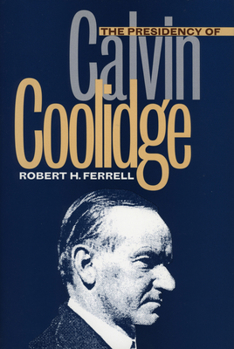The Presidency of Calvin Coolidge
(Part of the American Presidency Series Series)
Select Format
Select Condition 
Book Overview
Perhaps no American president has seemed less suited to his office or his times than Calvin Coolidge. The taciturn New Englander became a vice presidential candidate by chance, then with the death of Warren G. Harding was thrust into the White House to preside dourly over the Roaring Twenties. Robert Ferrell, one of America's most distinguished historians, offers the first book-length account of the Coolidge presidency in thirty years, drawing...
Format:Hardcover
Language:English
ISBN:0700608923
ISBN13:9780700608928
Release Date:June 1998
Publisher:University Press of Kansas
Length:260 Pages
Weight:1.46 lbs.
Dimensions:1.0" x 6.4" x 9.3"
Customer Reviews
2 ratings
valuable
Published by Thriftbooks.com User , 14 years ago
This is the first biography I read of President Coolidge. It is very dry and academic in style, but I didn't mind. I now believe that if any twentieth-century American president could be called a good man, it must have been Calvin Coolidge. He had possibly the most outwardly uninteresting and unappealing personality of any president, but who cares? because I believe he was more committed to leaving the American people alone, to not intruding in their everyday lives, than any president outside the Founding Fathers' generation. He was also probably the president most committed to fiscal discipline: every year of his one term saw the budget balanced; taxes were repeatedly cut, and Coolidge once made a speech about reducing pencil expenditures! About his laconic and unsociable personality, there is a plausible theory in another bio I plan to read. Calvin Coolidge's younger son, Calvin Jr., died in 1924--the same year Coolidge was elected for his own term after replacing the deceased president Harding. Robert E. Gilbert believes that because of Calvin Jr.'s death, Calvin Sr. suffered from clinical depression throughout his term, which would explain his quiet, passive and often socially inept behavior. I also plan to read Coolidge's autobiography, which he wrote not long after leaving office.
An objective and well researched account.
Published by Thriftbooks.com User , 26 years ago
The thirty-second volume in the acclaimed American Presidency Series presents a complex man and his struggles to solidify the economy and use cautious diplomacy in foreign affairs. Contrary to popular opinion, Robert Ferrell argues that Calvin Coolidge worked vigorously to achieve successful legislation and his dedication to public service provided him with a good background for the presidency from 1923 to 1929. The author, however, does recognize that Coolidge sometimes waited out troubles, acted indecisively, and displayed inactivity in foreign relations. For example, Ferrell avers that the president and his ministers incompetently handled political problems in Nicaragua and economic instability in Mexico. Also, the author acknowledges that Coolidge did not grasp the economic currents of his time. Ferrell raises the question in this study: "Why did Coolidge not do more to deal with economic matters and consult with his advisors?" Perhaps the author answers this question in mentioning the Federal Reserve's reluctance to intervene in monetary policy and stock market speculation. In addition, Ferrell analyzes Coolidge's political philosophy on two counts: his opposition to governmental paternalism and belief in laissez-faire economy. In fact, Ferrell writes that Coolidge cut income taxes drastically; by 1927, 98 percent of the population paid no income tax. The Presidency of Calvin Coolidge judges the president in an objective manner and uses extensively researched primary and secondary sources. The author, however, does tend to use quotes excessively and this may irritate some readers. Besides, Ferrell gives a vivid account about society in the 1920s, but his information about automobiles appears repetitive at times in this book. Furthermore, Ferrell suggests that to blame Coolidge for lack of foresight in not preventing the holocausts of our time seems unhistorical. Yet, a historian does indeed judge people and historical events both diachronically and synchronically. Overall, Fer! rell admirably addresses Coolidge's strengths and weaknesses in an analytical framework. Finally, the photographs add a realistic vision about Coolidge and his times.






